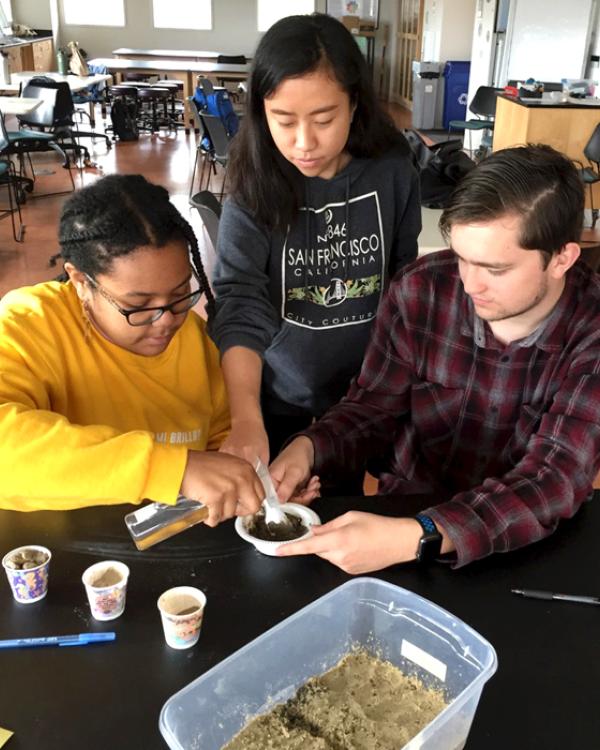
In the next five years, California will need to replace at least 11% of its aging mathematics and science teachers due to retirement. Even before that happens, the average class size for high school science in California right now is 27, well above the national average of 22. We direly need more science and mathematics teachers.
One answer to that shortage comes from the Gevirtz School. We were just awarded a new, five-year National Science Foundation Noyce Teacher Scholarship grant for $1.1 million. The project, entitled COASTAL: Collaboration for Opportunities in and Advancement of STEM Teaching and Learning, aims to serve the national need to prepare high-quality science teachers for high-need school districts. COASTAL has both an undergraduate component beginning this year and a component for credential candidates in the Teacher Education Program that begins starting next year.
“The COASTAL grant will provide undergraduate interns with the opportunity to broaden their thinking about how students learn science and engineering by observing science learning in innovative education environments,” says one of the grant’s co-PIs, Dr. Danielle Harlow. Over the course of the year, undergraduates from UCSB and Santa Barbara City College (SBCC) will have opportunities to observe and facilitate learning at MOXI, the Wolf Museum of Exploration + Innovation and at the Dos Pueblos Engineering Academy (DPEA) and take a course at UCSB. It’s an unprecedented collaboration.
At MOXI, COASTAL interns will observe children and adults working together to build understanding through exploring open-ended science exhibits. “The diverse audience in a public space like MOXI means that the interns might facilitate an activity with toddlers and physics professors simultaneously and that both would gain something from the experience,” Harlow, a professor in the Department of Education, explains. “They will work with visitors of a range of ages, cultural backgrounds, abilities, languages, and interests. By facilitating the same exhibits many times with such diverse audiences, the interns will develop a rich understanding of how people think about and engage with science.”
Meanwhile at DPEA, the interns will assist in teaching an innovative project-based curriculum that places high school students in the roles of engineers. “Not only will the interns develop skills as they explore teaching as a possible career path, but they also can learn new skills such as machining, coding, artistic design, computer aided design and manufacturing, electrical and mechanical engineering,” says Melisa Woods (SST/Physics, M.Ed. ’99), a co-PI of the grant and teacher at DPEA. “The COASTAL interns will gain insight into California’s initiative to increase career and technical education for public school students and will begin to think about innovative curriculum that they might develop in the various sectors promoted by the initiative.”Together, these experiences will broaden the interns’ understanding of science learning opportunities and help them develop new ideas about how the Next Generation Science Standards (NGSS) can be implemented, as those recently adopted standards ask all science teachers to teach engineering.
This is the School’s fourth Noyce award. In our previous Noyce CalTeach Physical Sciences and Engineering program, we focused on providing undergraduate physics majors and preservice physics teachers the opportunity to learn how to teach engineering. In this Noyce award, we are working to prepare all science majors and preservice science teachers—including chemistry and biology—to teach engineering. “We are providing them experiences to learn about engineering not only by participating at the DPEA but by participating at MOXI as well,” says co-PI Dr. Julie Bianchini, the UCSB CalTeach Faculty Director. “The goal of the undergraduate component is to encourage STEM undergraduates to pursue a teaching credential after they graduate.”
In addition to the dozen undergraduate interns, beginning in 2020-21 approximately 13 Noyce COASTAL Teacher Scholarships (up to a $15,000) will be awarded each year for five years for graduate students in the Teacher Education Program. As they work for their credentials, they will complete part of their student teaching experience at DPEA, learn about informal science education centers at MOXI, and participate in cohort-building, educational enrichment, and career guidance opportunities. In exchange for the scholarship, after graduation, Noyce COASTAL Teacher Scholars must teach for two years in a high-needs school district.
NSF grant monies that support the TEP fellowships have been instrumental in recruiting and supporting students in earning a teaching credential at UCSB. “Because the UCSB TEP is expensive and students cannot work while they are earning their credential, having a large scholarship from NSF helps defray the cost of attending,” Bianchini points out. “The fellowship component of COASTAL has been helpful in attracting students from diverse groups.”